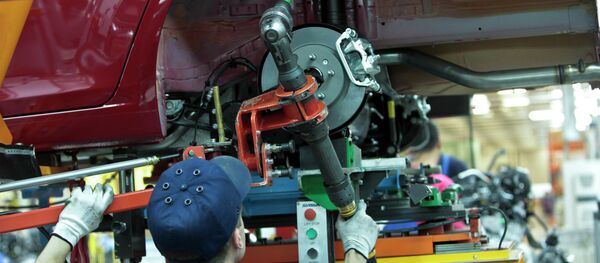Kristian Rouz – After the US dollar appreciated an average of 22% against its major peers during the past year, many of the US-based multinational enterprises are facing a hard choice. That is, to either accelerate the pace of re-shoring of their manufacturing facilities from overseas, or face imminent losses on theircorporate earnings.
The puzzle is complicated, and while there are plentiful wrong solutions to it, there are two recipes of success.
Now, what makes the whole situation this complicated?
Many American multinationals, despite the ongoing wave of big industrial manufacturing returning home, creating jobs in America and readjusting to the domestic market, are still making a lot of money in overseas markets. As such, automotive giants like Ford and GM, have plants and assembly lines all over the globe, with cars being produced locally and sold immediately off the factory gate – with all transactions denominated in local currencies. These earnings, converted into dollars amidst the global wave of money-printing, are shrinking, rendering American production in other countries less economically efficient.
Due to such stalemate, where US companies find themselves trapped between an excessive and unnecessary presence in foreign markets, while lacking competitive edge, willingness or investment capacity to accelerate the pace of re-shoring, Wall Street has downgraded its forecast on growth in corporate profits in 2015 to 1.3% from the January reading of 8.1%. Corporate earnings are projected to drop on the S&P Index by 3.1% in Q1 2015 and by 0.7% in Q2 before recovering later on.
As the situation in the US economy now is overtly dependent on the US Federal Reserve decisions and the volume and appropriate allocation of governmental investment, there are two solutions to the current misconception.
The first is, if the Fed continues its monetary tightening, hiking base interest rates in June, America’s biggest corporations must respond with increased spending in moving their facilities stateside. In such circumstances, this is the only thing that can save them a lot of money in the future, as foreign nations will only expand the scope of money-printing, devaluing their currencies against the dollar to benefit their exporters and domestic manufacturers.
The pace of re-shoring in this scenario might be slower than in the previous one, but will still demand bigger investment than there is now. Otherwise, any delay in pulling out of the foreign markets, will cost US businesses tens of billions of dollars in losses in the medium term of 3 to 5 years from now.
The silver lining here is that, despite the losses in corporate earnings, the rebound will start in the Q3 2015 even at the present pace of re-shoring.
Now, in order to make that rebound firmer and to provide a kickstart to America’s prosperity, the fat-cat capitalists and the federal government need to cooperate, investing in the right things now not only to avoid the unnecessary losses, but to multiply the future gains of the healthy economic environment at home.







